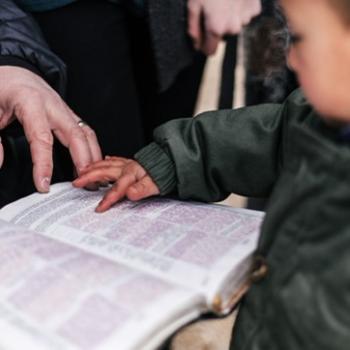Who is it that you say Christ is? Far too often this question is relegated to the unbeliever, whether the atheist, Hindu, Buddhist, Muslim, Agnostic, or whomever. Christians have appropriately asked this question, albeit in different words, in order to elicit the response of Peter in Mark 8:29, or perhaps even more dearly, in John 6:68-69. That confession – the recognition of Christ’s divinity and the intrinsic, life-giving words He spoke, is what all Christians desire to hear of their friends and family. Their hearts ache in their longing for them to not only see this truth, but confess it, and walk in repentance and faith. Yet ultimately, this same question is what drives unity within the church.
However appropriate this question may be in the realm of apologetics, we stand on faulty ground if we neglect to continue to ask this question ourselves as those in Christ. The question no longer resides upon the grounds of unbelief. No, the question resides upon knowing who Christ has claimed to be, confessing that He is indeed our Lord and Savior – and like Peter, that we have no one else to whom we would go, for He has the words of eternal life. The question is resolved then in knowing this Savior and making Him known. As the scope of this current piece is to deal with the former rather than the latter, we must approach this question for ourselves rather than for others.
We must approach this question wholeheartedly as those who are now in Christ because its implications reach into every single aspect of our lives. There is no space left uncharted when Christ has taken residence within His church; He is Lord of all men, yet especially so of His church. The church is so intimately connected with her Savior that she is called His body. Slow down here. Think upon this. Wrestle with the implications of what it means to be connected to Christ, under His headship. Think of how this manifests itself with respect to your sins and desires. Think of how this then transforms how we are to view the brethren – and how even what we feel is secret sin will taint that union with them and Christ.
This is precisely the idea Paul speaks to in Ephesians 4 when Paul draws the correlation between the various gifts of the Spirit given to “…equip the saints, to build up the body of Christ, until we reach unity in the faith and in the knowledge of the Son of God, as we mature to the full measure of the stature of Christ” (vv. 11-12). The antecedent to this is connected directly Christ’s condescension and ascension, who did so in order to fill all things (v. 10) in order for all of us to reach this unity in the faith and in the knowledge of the Son of God. Notice when it happens: not before, not after, but it is as we mature to the full measure and stature of Christ. It is as we (the church) are being transformed into His likeness and what’s more than this, it is a continual process.
He then goes on to draw out the implications of this in how the church must act in recognition of what Christ has done, so that we may actually reach this unity in the faith and knowledge of the Son of God. This is not where theology transforms into practice, but rather, demonstrates theology is inherently practical. There is no true theological reflection honoring to God if the outworking of this does not meet in piety and devotion. Instead, all one will find is the banal sentiments of a ranting fool who espouses his knowledge, yet has divorced the indicatives of the gospel with the imperatives. More clearly, this fool is the one who has not only misunderstood the very grace he claims to lay hold of, but the one who separates the reality of what Christ has accomplished for the church from what the church is now called to walk in: holiness and devotion.
How might one reach such a conclusion? Paul expresses that those who are being used to equip the saints, in order to build up the body of Christ, until we all reach unity of the faith and in the knowledge of the Son of God, must no longer walk as the Gentiles do, in the futility of their thinking. The plain indication here is that the church is to be radically different; they are to be holy, or set apart, for the specific purpose of being a sacrifice to God and one another. This all hearkens back to walking in a worthy manner of the gospel of Jesus Christ and being joined into one body and one Spirit, for He is Lord over all and through all and in all. It is an intrinsically Trinitarian passage, yet the clear reference in this is Christ. It is His work, it is His death, it is His ascension, which accomplished the purchasing of those whom were alienated and estranged so that they might then be given as apostles, prophets, evangelists, pastors, and teachers (v. 11).
Yet notice what Paul grounds all of this in: service to one another until we all reach unity in the faith and in the knowledge of the Son of God. What is especially interesting is that Paul does not ground this solely upon theological grounds, but instead, in the various gifts of the Spirit given for the edification of this body, which are ultimately grounded in love. These various gifts given are those specifically intended for this edification toward the unity of the faith and knowledge of Christ – but this does not necessitate that all be in a position of teaching or authority.
Now, it is quite clear that these gifts would include the offices of elder and teacher. The incredibly specific point of Paul here is that these men who have been gifted by the Spirit of God for the purpose of the church’s edification will be the very same ones who equip the saints for works of ministry – and they will do so until this unity in the faith and knowledge of Christ is reached.
This is not an exhaustive list of the Spirit’s gifts poured out within the church, nor does it seem to be intended to be. Rather, the focus is that the Spirit has equipped the church to be in service to one another so that in this glorious act, that is, unity of the faith and knowledge of Christ, is fulfilled. This is further supported in v. 16 wherein we recognize that “…as each individual part does its work, the body grows and builds itself up in love.” What are we being built up to? Christ Himself, who is the head of this body (v. 15). This demonstrates the active transformation happening within those who are called according to His purposes and for His glory.
It is also quite clear in this passage the true referent is Christ, who has accomplished this task through his life, death, resurrection, and ascension – for these very acts were those done, “in order to fill all things.” Without the work of Christ, the church would merely be a social club wherein people might be tempted to some form of humanistic altruism. The reality is that it would be without reference to the very one who condescended and then ascended, and through this, brought about the blessing of the outpouring of the Spirit upon all peoples in the church. What this plainly means is that this group would be separate of the head; it would be a lifeless mass bound in the folly of sin and at enmity with God.
The proximal position of the church, being under the headship of Christ, yet directly attached to Him, brings us back to the original question: who do we say Christ is? Those two little phrases, “in the faith” and “in the knowledge of the Son of God” are both subordinate to the word “unity” in v. 13. What this plainly evidences is that this unity is both in the faith in the knowledge of the Son of God; the prepositions “in” along with the definite articles (the) specify what and where this unity is found. It is a knowledge of the historic faith, handed down from the apostles, and a knowledge of Christ. Yet this knowledge is never divorced from service to the body of Christ.
Quite simply, it is a deep, residual, abiding in Christ; it is an ever-present state of being where we not only press forward in continually growing in this knowledge of the faith and the Christ – we press forward in growing in our service to one another so that this knowledge of the faith and the Christ would lead us to grow up into Christ Himself. It is so that we would mature into the full measure of the stature of Christ. More clearly, it is this thing, through the gifts given by the Spirit, because of what Christ has done, and for the purpose of glorifying the Father, that truly demonstrates we are walking in a worthy manner of our calling to this one hope we have.
There are an infinite number of things capable of distracting us from answering the question of who Christ is. There has never been, is not now, and will never be, a shortage of sins, pitfalls, and distractions that will keep us from thinking deeply on that question. We live in a titillating culture that has become altogether bored with the methodical plodding that is the Christian life – yet those in Christ are called to a rather different set of values and perceptions on these things.
We must come to ask if we echo the words of Peter and truly believe that there is no one else to whom we could go – or do we, perhaps, ascent to this knowledge, yet not walk in it? We must likewise come to ask ourselves in what ways we have compromised developing a deeper, abiding fellowship with the body of Christ and coming to grow in the unity of the faith and knowledge of Him. Yet I do not wish to leave the reader without hope of any sort – for again, this passage is not only incredibly Christ-centered, but inherently Trinitarian. This work is not only something we are commanded to walk in, but one that happens as we mature to the full measure and stature of Christ. This work is not only something we walk in as individual believers, but as the church, so that the body grows and builds itself up in love.
What this means is:
- You have not been left without the continual work of the Triune Lord to bring you to sanctification and build you up to the fullness of Christ’s being. That maturation process is not only one you are to walk in, but one that God has a vested interest in maintaining and drawing you to walk in. Why? God loves the church far more than any could imagine and He desires her holiness.
- This is a work done in community. There are no lone Christians who can even remotely accomplish unity in the faith and the knowledge of Christ. There are no lone Christians who can build themselves up apart from the body of Christ. The cold reality is that a Christian will not be built up in the faith and the knowledge of Christ without the other members of the body. The intellect can only carry one so far.
- As a result, we will no longer be infants who are tossed about by the waves and carried around by every wind of teaching and by the clever cunning of men in their deceitful scheming (v. 11), but instead, we will grow up into Christ (v.12). The result of this work being done on our behalf, walking in this work and obeying the imperative command, and be intimately connected with His body (and of course, Christ Himself), is that we will become like Him.
The question of Christ to Peter is not simply one we ought to ask unbelievers. While it is a proper apologetic approach, it is a question we must come to terms with ourselves. We must be continually reminded of who Christ is and what He has done so that now, as those who have been united to the Lord and forgiven of our sins, we can walk in that newness of life and live in a manner pleasing to God. We must ask this question so we not only grow in respect to our knowledge of Him, but in unity with the brethren in this and the historic, Christian faith.













